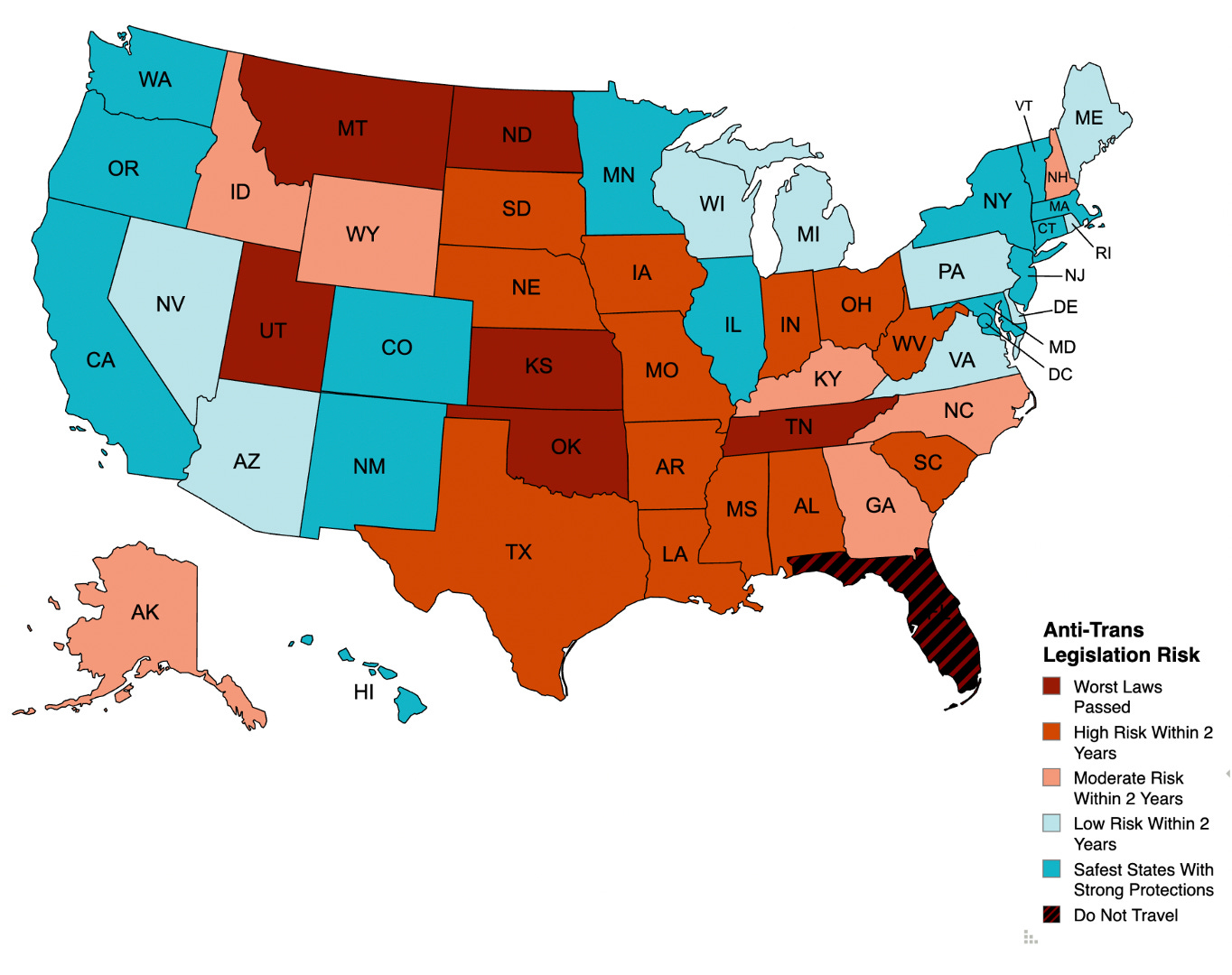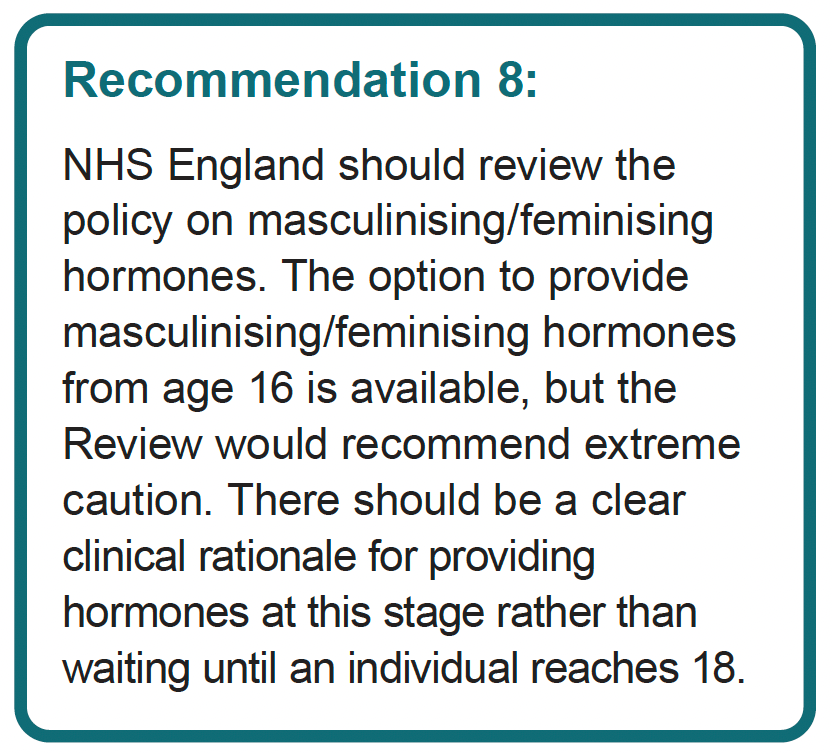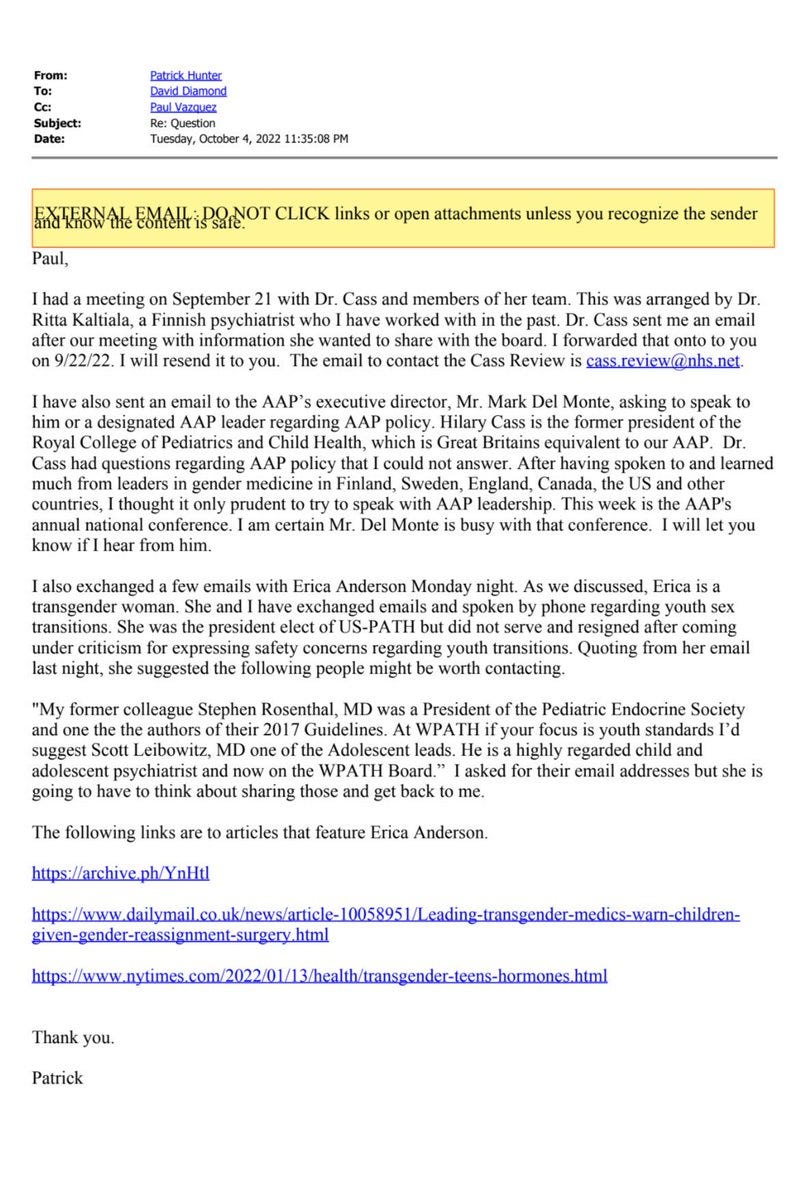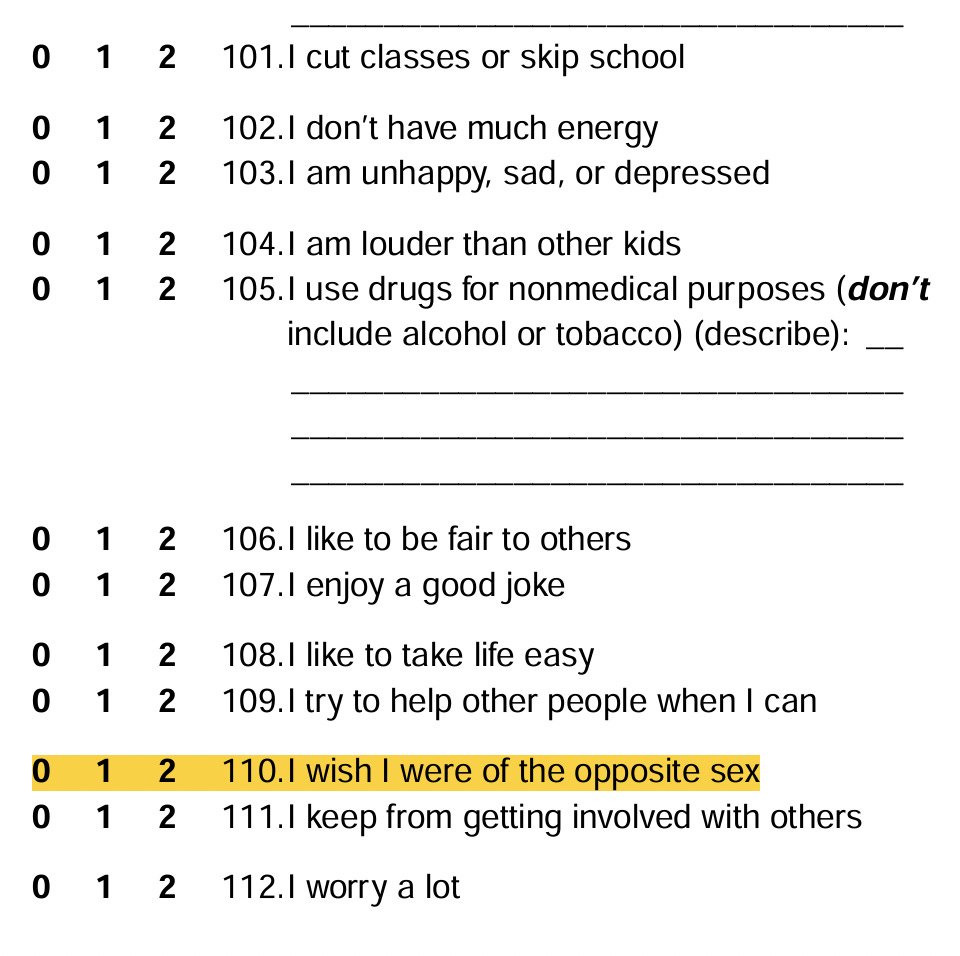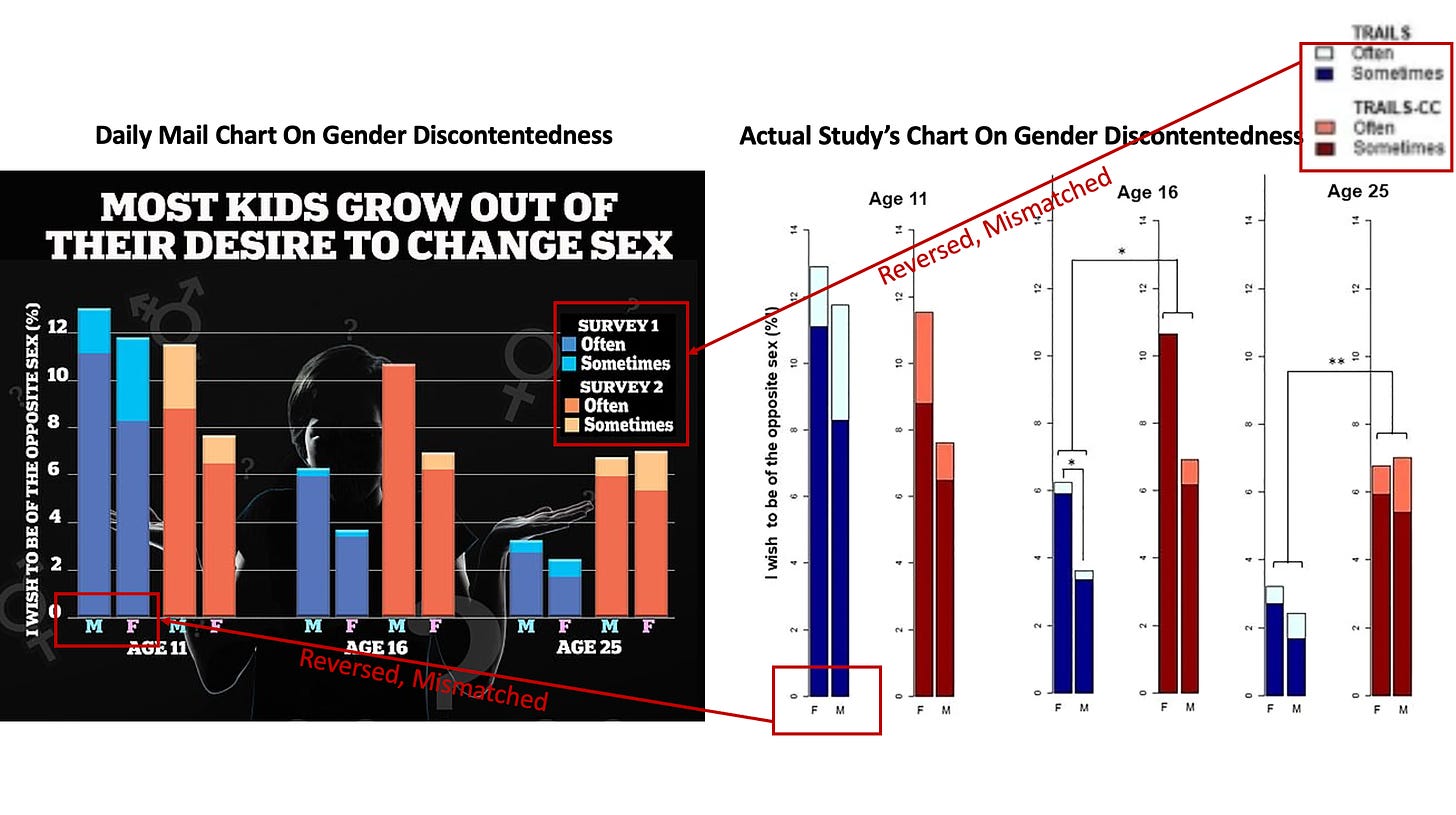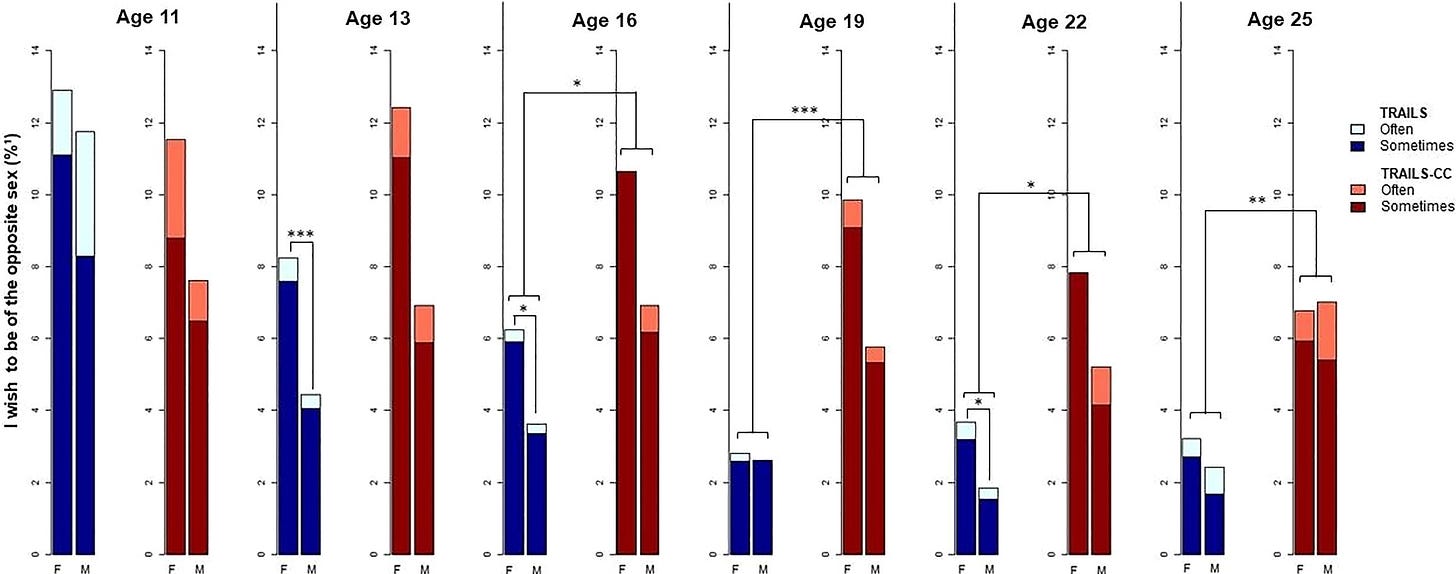Political commentary & analysis
Anti-trans legislative risk assessment map – February Update
6 weeks into 2024, there are already 400+ bills targeting transgender people. This map assesses the risk of the worst laws passing
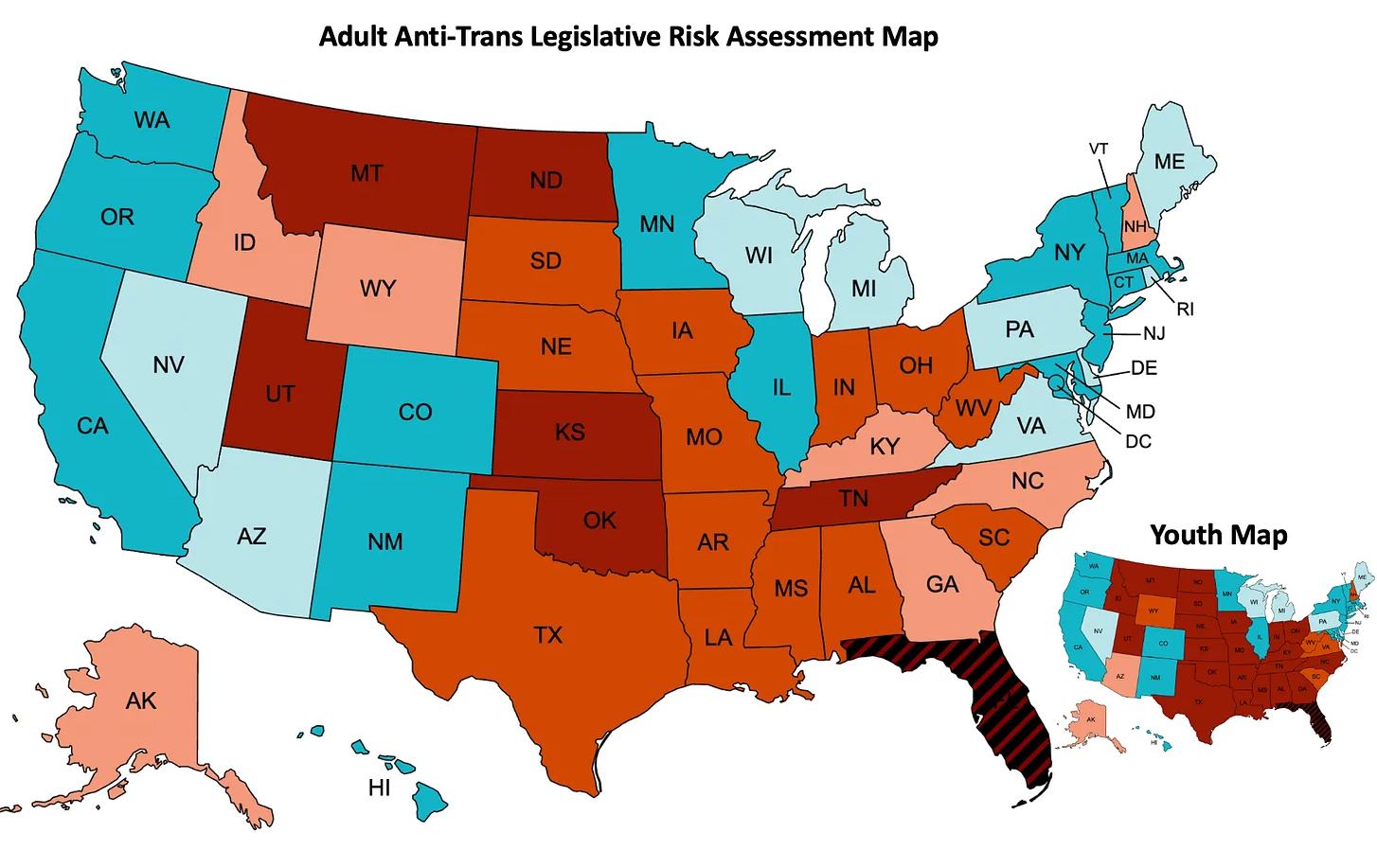
By Erin Reed | WASHINGTON – I have tracked anti-transgender legislation for 4 years @erininthemorn on Twitter and TikTok. Every day, I’ve gotten messages from worried people wondering how they are supposed to assess their risk of staying in their home state.
The messages range from parents of trans youth wondering if their children will be taken from them to trans teachers wondering if their jobs will be safe in coming years. Sometimes people just want to know if there is a safer state they can move to nearby.
I created the legislative risk map specifically to help answer that question. Now more than ever, it is a question that needs answering for so many transgender people facing forced medical detransition, arrests for using the bathroom, bans on the use of our names, pronouns, and identification documents, and many other curtailments of our rights to exist in public life.
In previous iterations of the map, the focus was entirely on the risk to transgender youth. When the map was first developed, bills targeting transgender youth were far more common. Unfortunately over the last year, the transgender youth map has lost all granularity, largely reducing to just two colors: red and blue, a set of states criminalizing trans youth and a set of states protecting them.
You can still find this map at the end of the document, and it will be continually updated. The primary map of focus, though, will be the transgender adult map, as bills targeting trans adults have become far more common.
Methodology
The methodology used is primarily qualitative, with a scoring-rubric element for the worst bills. Part of the methodology is my own expert assessment of laws, of which I am well equipped to do. I have read all 550 bills that target trans people in America in 2023 and 400 in the first 6 weeks of 2024. I have watched hundreds of hours of hearings on anti-trans legislation and am fully aware of all of the players nationally as well as where they are making their pushes against trans rights. I have followed the vote count and talk to activists on the ground in each state. I am looking at how similar states are moving in their legislative cycles. Lastly, I watch for statements by governors and bill drafts to see if the Republican party in various states seems to be pushing anti-trans legislation heavily – you can see many examples of such legislation in this newsletter.
In terms of actual laws, I keep a rubric of the various types of laws that target transgender people. For transgender youth, the most concerning laws are those that prohibit gender-affirming care and mandate detransition. Additionally, bathroom bans, laws that rigidly define sex as binary, and restrictions on social transition are other key factors that negatively impact a state’s ranking. For transgender adults, the primary legislative concerns include adult gender affirming care bans, bathroom bans, prohibitions on drag specifically aimed at trans people and pride events, restrictions on changing birth certificates and drivers licenses, and laws that end legal recognition for trans people entirely. These factors play a significant role in how I assess and rank a state’s legislative risk.
The Adult Trans Legislative Risk Assessment Map
This updated map delineates the legislative risks concerning laws aimed at transgender adults in the United States. States like Florida have eliminated 80% of all trans adult care, adults can be thrown in jail for using the bathroom of their gender identity, and trans people with correct gender markers on their drivers licenses can be charged with fraud. Multiple states have passed laws ending all legal recognition for trans people. As such, starting this year, adult risk levels for trans people will be tracked on its own map.
Moves in this update: Utah (High Risk → Worst Laws Passed), Iowa (Medium Risk → High Risk), South Dakota (Medium Risk → High Risk)
- Summary of updates: There are two major moves on this map update. Utah has passed a bathroom ban targeting transgender people, but it is unclear on how or where the law applies. Similarly, the same bill defines sex in a way that ends legal recognition for trans people in much of Utah’s code. For Iowa and South Dakota, many harsh anti-trans laws have been proposed and have already passed at least one committee vote. South Dakota’s drag ban, which passed committee, could be used to target Pride festivities. Iowa, meanwhile, has a bill that could require all transgender people who change their birth certificates to have a special gender marker that would out them as trans that is moving through and has already passed a committee vote.
Nationwide Risk: Moderate. Increasing bills targeting trans adult healthcare and campaigning by Republican presidential candidates means that there could be national anti-trans laws should Republicans gain all 3 branches of government.
Here are the categories:
- Do Not Travel (FL): The only state earning a “Do Not Travel” advisory is Florida. Florida has a law that allows for the arrest of transgender people for using bathrooms according to their gender identity and another policy targets transgender people’s drivers licenses. Local LGBTQ+ orgs as well as HRC have issued travel advisories for the state. This analysis likewise concurs with such a rating.
- The Worst States (KS, MT, ND, OK, TN, UT): These states have passed deeply troubling legislation targeting transgender adults in extremely harmful new ways. Kansas, Florida, and Utah have bathroom bans for transgender adults, while Tennessee briefly enacted a law requiring signage to warn of the presence of transgender individuals in restrooms. Many, including Florida, Kansas, Montana, Oklahoma, and Tennessee, have gone so far as to legislatively erase transgender people, effectively removing any legal rights associated with their gender identities. Other states, such as Kansas, North Dakota, Oklahoma, and Tennessee, prohibit any changes to birth certificates, forcing trans people to out themselves when showing their documents. In Kansas, this law could even force individuals who have updated their driver’s licenses and birth certificates to see their gender markers reverted. These states also could start targeting adult gender affirming care – Florida has already done so, banning 80% of such care. Florida has also put into effect a policy that says trans people “misrepresenting” their gender on their drivers license could be guilty of fraud.
- High-Risk States (AL, AR, IA, IN, LA, MO, MS, NE, OH, SC, SD, TX, WV): All of these states have passed some anti-trans adult laws, but they haven’t reached the same level of severity as the worst states. Missouri and West Virginia, for example, prohibit gender-affirming care for incarcerated adults as well as transgender youth and have seen new laws proposed this cycle going even further. Nebraska’s governor has issued an executive order ending legal recognition of trans people. Additionally, some of these states, including Alabama and Arkansas, have laws that permit the refusal of medical care to LGBTQ+ individuals on religious grounds. South Dakota is advancing a drag ban that could block Pride parades from happening, and Iowa may soon require trans people to have special markers on their birth certificates identifying them as trans. Although each of these states has laws targeting transgender adults, none have done so to the extent of the worst states.
- Moderate-Risk States (AK, GA, ID, KY, NC, NH, WY): These states have either passed one or two laws aimed at transgender adults or have enacted multiple laws targeting transgender youth, or are advancing negative laws quickly. For states focusing on trans youth, history shows they are more likely to introduce anti-trans legislation for adults in subsequent years. All of these states are under Republican control, either through supermajorities in the legislature or Republican governorships. Many have enacted “Don’t Say Gay” provisions, which frequently result in the banning of transgender teachers – in Georgia, for instance, a teacher was fired for merely reading a book with a character that could vaguely be interpreted as transgender. Additionally, many have passed religious refusal rights bills. However, most of these states have either not yet ventured into anti-trans adult legislation or have only passed milder forms of such laws.
- Low-Risk States (AZ, DE, ME, MI, NV, PA, RI, VA, WI): These states have largely refrained from targeting transgender adults, although they haven’t taken extraordinary steps to protect adult transgender rights either. For example, Arizona and Virginia have enacted anti-trans policies affecting youth but, due to state-specific factors, appear unlikely to extend such policies to adults. Conversely, Michigan, Maine, and Nevada have enacted fairly robust non-discrimination policies but fall short in ensuring healthcare equity and providing protections for incarcerated transgender individuals. While these states generally offer a safer environment for transgender adults, they stop short of going the extra mile to make their jurisdictions unequivocally safe places to reside.
- Most Protective States (CA, CO, CT, DC, HI, IL, MA, MD, MN, NJ, NM, NY, OR, VT, WA): These states have gone above and beyond in safeguarding the rights and well-being of transgender individuals, making them highly desirable places to live for those in search of security. States like Colorado, Hawaii, Maryland, and Washington have enacted comprehensive health insurance laws that cover facial hair removal and an expanded range of medical procedures. Each of these states offers refugee protections for individuals fleeing more repressive states with anti-trans laws. Care is not only supported but also enjoys legal reinforcement from the state, ensuring accessibility as long as such treatments remain lawful at the national level. These states are the most likely to counteract federal anti-trans regulations if faced with a Republican presidency.Please support my independent reporting and advocacy on transgender legislation by subscribing. You help me keep this going and keep people informed.Subscribed
The Youth Trans Legislative Risk Assessment Map
Very few states now occupy the middle ground in the realm of anti-trans legislation for transgender youth. Those marked in dark red have enacted bans on gender-affirming care for transgender youth, with many even mandating medical detransition for these young people. Conversely, states shown in dark blue have implemented refugee protection laws for trans youth seeking to escape the harsh legal environments of more restrictive states.
Moves in this update: Ohio (High Risk → Worst Laws), Wyoming (Medium Risk → High Risk), Arizona (Low Risk → Medium Risk)
- Summary of updates: Major shifts have occurred for transgender youth on the latest iteration of this map. Ohio has moved into the list of states with the worst anti-trans laws after a harsh gender affirming care ban for transgender youth in the state. Wyoming, which has up to this point resisted anti-trans legislation, has advanced several anti-trans bills that could ban care for trans youth through for full consideration. Perhaps the biggest surprise though comes in Arizona, where Republicans appear to be pushing through a bill that would escape the Governor’s veto by placing a trans student bathroom ban and forced outing policy on the ballot for voters in November.
Nationwide Risk: Moderate. Increasing bills targeting trans healthcare and campaigning by Republican presidential candidates means that there could be national anti-trans laws should Republicans gain all 3 branches of government.
****************************************************************************

Erin Reed is a transgender woman and researcher who tracks anti-LGBTQ+ legislation around the world and helps people become better advocates for their queer family, friends, colleagues, and community. Reed also is a social media consultant and public speaker.
Political commentary & analysis
20 bills die as Iowa Legislature adjourns-attacks on LGBTQ+ fail
Iowa becomes the latest state to adjourn Sine Die without passing a single piece of explicitly anti-LGBTQ+ legislation

By Erin Reed – DES MOINES, Iowa – In the latest in a series of victories for trans and queer people in statehouses across the United States, Iowa’s legislature has adjourned sine die without passing a single piece of explicitly anti-LGBTQ+ legislation.
This is despite more than 20 bills being introduced targeting LGBTQ+ individuals, including some introduced and prioritized by the governor herself.
Other states, which have historically shown a willingness to pass LGBTQ+ legislation, have also failed in efforts to pass such legislation this year, including Florida, Georgia, and West Virginia. This is leaving some to wonder if anti-trans and anti-queer politics are beginning to run into resistance, at least in the lead-up to the 2024 election fight.
This year, Iowa was at the center of numerous debates over anti-LGBTQ+ legislation, particularly targeting transgender individuals. One bill aimed to remove transgender people from the state’s civil rights code and declare them “disabled.”
Another proposal, known as the “pink triangle bill,” would have required special gender markers on the birth certificates and driver’s licenses of transgender people. One bill would have redefined “equal” to no longer mean “same” or “identical” for transgender people.
A further measure sought to ban transgender individuals from restrooms that match their gender identity. Nonetheless, all of these bills failed to pass as the legislature reached its closing hours.
This is not due to a lack of effort by a handful of Republican legislators who saw this as their priority issue. In the final moments of the session, sensing defeat, Republicans attempted to pass an anti-transgender birth certificate bill by introducing an amendment to ban such certificates onto a bill supporting the loved ones of fallen veterans.
Perhaps realizing that such a move would likely be seen as politically unpopular, they withdrew the amendment before the legislature adjourned.
Over 20 bills targeting the LGBTQ+ community that were introduced this year died. Counting rollover bills from the previous year, Iowa Safe Schools states that number is as high as 39 bills that have been defeated.
The only bills to pass was a broad “religious freedom restoration act,” which could allow broad discrimination against LGBTQ+ people and many other classes of people using religion as a shield, as well as a DEI ban. Though both bills have negative impacts on LGBTQ+ people, neither bill contained the targeted provisions seen in several others that were introduced this year.
Iowa has been the site of fierce resistance to anti-LGBTQ+ legislation this year. For one piece of legislation removing transgender people from the state civil rights code, over 300 people lined up in the hallway to speak out against the bill. When the bill was defeated in committee, cheers could be heard throughout the hallway.
Responding to that bills defeat at the time, Damian Thompson of Iowa Safe Schools stated, “From what I can tell, opposition was overwhelming, before the hearing, during the hearing, and after the hearing.” He later added, “This is the kind of response we need to see with every anti-LGBTQ legislation. We need the entire community united in opposition. What they are trying to do, we’ve seen it, they are trying to divide us. The LGB against the T, and it’s not going to work.”

Iowa is not the only state to witness significant victories over anti-LGBTQ+ and anti-trans legislation this year. Earlier, all explicitly anti-LGBTQ+ bills—20 in total—were defeated in Florida, prompting a statement from local HRC advocates that “The tide is turning.”
Similarly, over 20 bills failed in West Virginia, leading to celebrations. In Georgia, every anti-LGBTQ+ bill also failed, despite similar last-minute attempts to amend anti-LGBTQ+ legislation into entirely unrelated bills.
Although attacks on trans and queer individuals have encountered significant obstacles in Iowa and other states historically targeting LGBTQ+ people, some states are advancing with particularly severe legislation.
These states include Tennessee, Alabama, Mississippi, and Louisiana, all of which have introduced bills that would ban transgender people from bathrooms, allow individuals with religious objections to adopt LGBTQ+ children, and more.
Meanwhile, Ohio is moving forward with a bathroom ban that could affect transgender adults in colleges, and Utah has already passed a sweeping bathroom and locker room ban this year. Additionally, the United States presidential election is already witnessing political attacks on transgender individuals, which may intensify in the coming months.
For transgender Iowans, however, any further attacks will have to wait until the outcomes of the 2024 election cycle are clear. Early indications from Iowa suggest that such attacks may not be politically popular in the state.
For example, Moms For Liberty candidates were defeated in 12 of 13 highly contested school board elections in the state in 2023. Additionally, Pella, Iowa—a town that favored Trump by over 35 points—defeated a local book ban.
If similar election results occur in 2024, then attacks on LGBTQ+ individuals may continue to falter in the state, giving its trans and queer residents a moment to breathe as they begin the long battle to roll back harsh laws targeting LGBTQ+ people enacted in recent years.
****************************************************************************

Erin Reed is a transgender woman (she/her pronouns) and researcher who tracks anti-LGBTQ+ legislation around the world and helps people become better advocates for their queer family, friends, colleagues, and community. Reed also is a social media consultant and public speaker.
******************************************************************************************
The preceding article was first published at Erin In The Morning and is republished with permission.
Political commentary & analysis
Anti-trans British pediatrician backpedals on her review on HRT
Dr. Cass’s latest statements are likely to cast more doubt on the study, which disregarded substantial evidence on trans care

By Erin Reed | WASHINGTON – In the latest twist over the Cass Review, a controversial report released in England last week targeting transgender care, the review’s leader has seemingly walked back recommendations and findings that have already led to a crackdown on transgender care in the United Kingdom.
Dr. Hillary Cass, in an interview with LGBTQ+ organizations, reportedly stated that puberty blockers and hormone therapy should be made available at differing ages based on individual need, and that current policies in England often result in those medications being offered too late. This stands in stark contrast to the report itself, which presents much more restrictive findings and recommendations on trans youth care that have been used to ban treatments in the UK and cited by far-right organizations behind bans in the United States.
The Cass Review was commissioned and produced in England in the wake of political attacks on transgender people in the United Kingdom after clinic closures and skyrocketing wait times. The “independent” review was lead by Dr. Hillary Cass, who reportedly followed several anti-trans organizations on social media and who met with Governor DeSantis’ medical board and offered information in their efforts to ban care in Florida, leading to some to question that independence. Last week, the final review was published, leading to bans on puberty blockers in the country, citing the report as justification for doing so.
The report disregarded a substantial amount of evidence for transgender care as not “high quality” enough and then described the evidence surrounding transgender care as weak, despite other reviews, major medical organizations, and the largest psychological organization in the world finding the evidence compelling enough to support gender affirming care. This has led to a group of over 100 Irish academics decrying the review in a group letter. The report made a series of recommendations, such as Recommendation 8, which states that hormone therapy is available for 16-year-olds but should be administered with “extreme caution,” and encourages clinicians to delay the treatment until age 18 unless there are “clear rationales” for earlier intervention. It also called for significant restrictions on puberty blockers, limiting them to research studies only. These recommendations and Cass’s findings have been used to justify severe crackdowns on transgender care.
See recommendation 8 here:
Now, in an interview first reported on twitter by TransSafetyNow, Dr. Hillary Cass appears to substantially walk back much of her review, interpretations of that review, and even attempts to brush off her meetings with political appointees in the DeSantis administration who met with her to obtain information they would later attempt to use to ban trans care there. In the interview with UK-based LGBTQ+ organization The Kite Trust, Dr. Hillary Cass is asked if she believes it is OK to prescribe puberty blockers. Her answer is significantly out of alignment with her report:
“In the data the Cass Review examined, the most common age that trans young people were being initially prescribed puberty suppressing hormones was 15. Dr. Cass’s view is that this is too late to have the intended benefits of suppressing the effects of puberty and was caused by the previous NHS policy of requiring a trans young person to be on puberty suppressing hormones for a year before accessing gender affirming hormones. The Cass Review Report recommends that a different approach is needed, with puberty suppressing hormones and gender affirming hormones being available to young people at different ages and developmental stages alongside a wider range of gender affirming healthcare based on individual need.”
Her answer aligns more closely with the current provision of transgender care in many countries, where individual needs and circumstances are prioritized for each patient. However, this is not the tone of the report, which has been used to advocate for significant restrictions and even outright bans. In the United States, the report has been cited by the Heritage Foundation (retweeted) and the Alliance Defending Freedom, organizations that have been actively involved in bans on trans care. In the United Kingdom, the report has even prompted an inquest into adult trans care, raising concerns about its potential impact on this care as well.
Some have accused her answers in the interview as being an attempt to deflect criticism. This is particularly evident in her response regarding a meeting with Dr. Patrick Hunter, a Catholic Medical Association doctor who was tapped by Governor Ron DeSantis in the United States to ban transgender care. Following the publication of the Florida reviews and standards of care, which bears a resemblance to the Cass Review, lawsuits revealed that the review was deceitfully conducted. Evidence, including a PowerPoint document, showed that the decision to ban trans care had been made before the review had even begun. Documents produced by the lawsuit also revealed that Dr. Cass had taken a meeting and exchanged emails with the Florida team.
Dr. Cass, in the latest interview, denies any wrongdoing, stating:
“Patrick Hunter approached the Cass Review stating he was a paediatrician who had worked in this area. The Cass Review team were not aware of his wider connections and political affiliations at this time and so he met the criteria for clinicians who were offered an initial meeting. This initial contact was the same as any paediatrician who approached the study. The Cass Review team declined any further contact with Patrick Hunter after this meeting. Patrick Hunter and his political connections has had no influence on the content of the Cass Review Report.”
However, in a new email made exclusively available to “Erin In The Morning,” Dr. Cass’s denial of impropriety does not appear to tell the whole story. Although she claims that she was not aware of his political affiliations, we learn that the meeting was actually set up by Dr. Riittakerttu Kaltiala, a member of the Cass Advisory Board (declared in her conflicts of interest) whom Dr. Patrick Hunter says has worked with him many times in the past. In this email, we also learn that Dr. Cass followed up with information she wanted to share with the board.
Furthermore, Dr. Cass’s claim that this was the only meeting between members of the Cass Review team and medical board members appointed by Governor DeSantis to ban care is contradicted by a court deposition citing “regular meetings” with Dr. Kaltiala, the member of the Cass Review Advisory Board who arranged the meeting between Dr. Cass and Dr. Hunter.
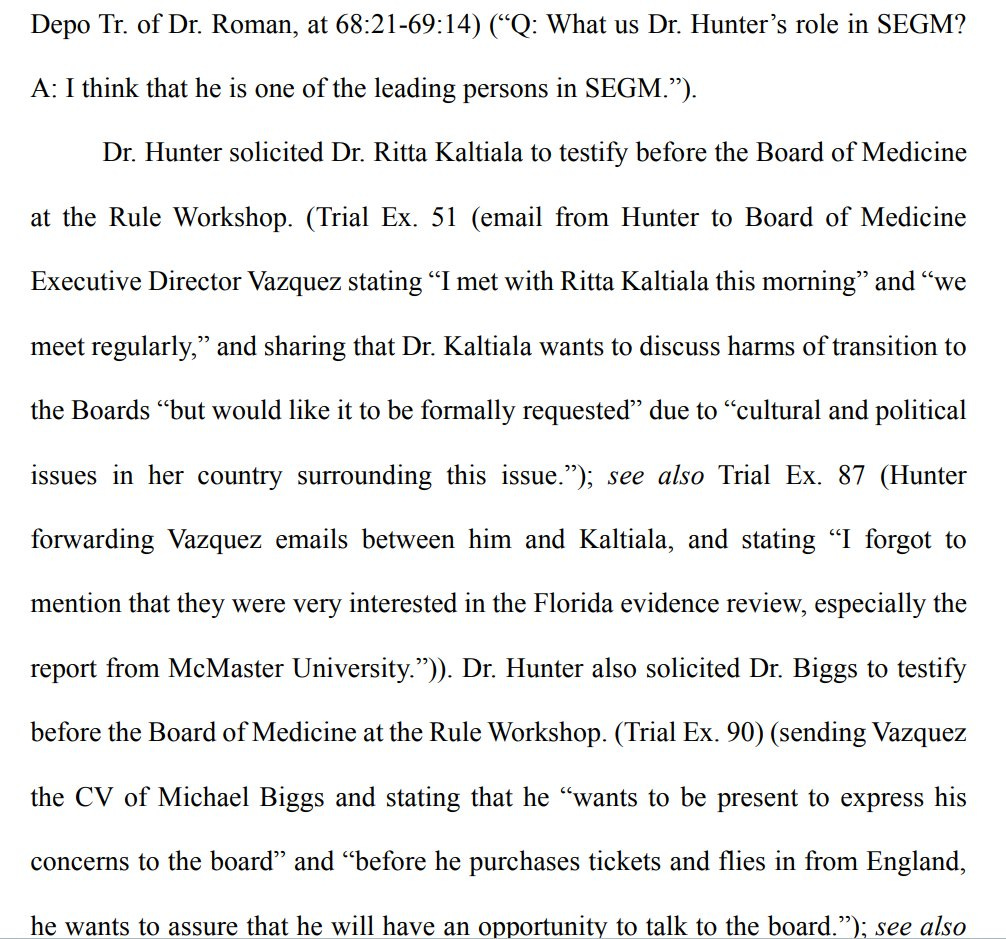
The interview is likely to further embroil the Cass Review in scandal both in the United Kingdom and internationally. It seems to represent a significant attempt to deflect criticism from the report by softening some of its conclusions. Moreover, the defensive tone of the report regarding those who influenced its production and meetings with politically charged appointees, who themselves have faced scrutiny over unethical and deceitful practices in reports on transgender healthcare, is bound to raise eyebrows.
However, it remains to be seen whether politicians in England or in red states in the United States, who are aggressively seeking any pretext to restrict care, will pause their efforts even with Dr. Cass tempering the implications of her report.
****************************************************************************

Erin Reed is a transgender woman (she/her pronouns) and researcher who tracks anti-LGBTQ+ legislation around the world and helps people become better advocates for their queer family, friends, colleagues, and community. Reed also is a social media consultant and public speaker.
******************************************************************************************
The preceding article was first published at Erin In The Morning and is republished with permission.
Political commentary & analysis
The impact of the Supreme Court’s Idaho ruling on trans people
The ruling is complicated & will have an immediate impact for trans youth in Idaho and could have national repercussions

By Erin Reed | WASHINGTON – On Monday, news broke that the Supreme Court of the United States will allow Idaho to enforce its ban on gender-affirming care for transgender youth, a felony ban that makes trans care punishable by up to 10 years in prison for doctors who provide it to those under 18.
The ruling was not based on the merits of gender-affirming care or its constitutionality; rather, it addressed broad injunctions and a lower court’s ability to block a law fully at the earliest stages — a pet issue for some conservative justices who chose to take decisive action when transgender lives were at stake.
The immediate impact of the ruling is clear: transgender individuals will be barred from obtaining gender-affirming care in Idaho, except for only two plaintiffs, despite no rationale for how a ban is supposed to work for everyone but those two plaintiffs when doctors are broadly barred from providing care. In other states where anti-trans laws are being litigated, the impacts are more nebulous, and the ruling could impact many other issues as well.
The case in question stems from a challenge to Idaho’s felony ban on gender-affirming care. In December 2023, a federal judge ruled that the ban was likely unconstitutional, ruling in favor of two transgender minor plaintiffs using pseudonyms.
The judge stated that the right to obtain medically necessary care for your children is “deeply rooted in this nation’s history and traditions,” using the logic from the anti-abortion Dobbs decision against transgender care bans as an apparent preemptive strike at such language being utilized to justify bans on trans care should the case ever reach the Supreme Court.
The judge then issued a broad preliminary injunction that prevented the state from enforcing the law on anyone while the court process played out.
It was the breadth of the injunction that came under dispute in the Supreme Court, not issues directly related to the constitutionality of transgender care. Attorneys for the state of Idaho argued that the injunction was too broad and that the state should be allowed to enforce the law on everyone except for the plaintiffs.
This would force anyone seeking care to seek individual exceptions and rulings from federal courts, an expensive endeavor. On the other hand, attorneys for the plaintiffs pointed out that the broad injunction was necessary: the plaintiffs were using pseudonyms to preserve their anonymity.
Without a broad preliminary injunction, doctors would be unlikely to continue offering care, thus making it impossible for the plaintiffs to access that care even with a ruling in their favor, and in doing so, they would have to forfeit their anonymity.
The majority of the court sided with reversing the injunction and allowing the law to go into effect for everyone but the plaintiffs, with a plurality signing onto Justice Gorsuch’s opinion stating that the ability of judges to issue broad preliminary injunctions should be muted.
They had little to say about the constitutionality of the law itself, except for Justices Kavanaugh and Barrett, who wrote in their separate concurrence that they believe the state may a likelihood of success on the merits [Update: Law Dork’s Chris Geidner states that the “merits” here, as Kavanaugh described it in his opinion, are about the scope of the injunction, and so it may not necessarily signal Kavanaugh and Barrett’s votes on the challenges to the gender-affirming care bans].
Instead, the real impact of this case will likely be on justices issuing broad preliminary injunctions to block statewide laws in the early stages of a constitutional challenge; it should not immediately impact any anti-trans laws being decided on the merits.
Of course, this provides little consolation to transgender young people in Idaho, who will have to go without access to their medication in the state even though two courts have ruled that the law blocking them is likely unconstitutional. It also raises questions about other broad preliminary injunctions nationwide on transgender topics: we likely cannot expect each student to take their school to federal court every time they want to challenge an individual bathroom ban in their local high school, for instance.
These questions have a significant impact on transgender individuals but will not only affect transgender people. They will arise anytime a state passes a law that is broadly enjoined at the preliminary stage by lower courts. This issue has surfaced in many other cases, from ghost guns to the mifepristone case, where sometimes broad preliminary injunctions are viewed favorably by the same justices who just ruled negatively on them for transgender individuals.
The impact of the ruling will likely be initially muted for transgender people nationwide. While it will have a significant impact in Idaho, there are no cases currently pending on transgender healthcare where a broad federal preliminary injunction is in place, other than in Idaho.
The case in Arkansas, for instance, has moved well beyond the preliminary injunction stage and has been ruled unconstitutional on the merits. However, numerous other cases are still being litigated, and states are enjoined on a wide range of topics, many of which have been broadly enjoined while awaiting a final constitutional ruling on the law. It remains to be seen if any of these broad injunctions are similarly challenged.
It is also important to note that this will not impact any rulings made under state-level litigation. For instance, in Montana, a ban on gender-affirming care is enjoined from enforcement using the state constitution’s right to seek “safety, health, and happiness in all lawful ways,” as well as an explicit right to privacy.
Meanwhile, in Ohio, a state challenge is currently underway using a provision in the state constitution that bars the state from issuing penalties for obtaining or providing healthcare. These state challenges will be insulated from anything that happens at the Supreme Court level.
Still, the ruling will mean further hardship for transgender youth in Idaho, and could signal that the Supreme Court is willing to take drastic action when it comes to transgender healthcare, even if that action is not directly related to the merits of the healthcare bans themselves. The Supreme Court could address the issue on the merits at any time, and it seems increasingly likely that it will in the near future.
****************************************************************************

Erin Reed is a transgender woman (she/her pronouns) and researcher who tracks anti-LGBTQ+ legislation around the world and helps people become better advocates for their queer family, friends, colleagues, and community. Reed also is a social media consultant and public speaker.
******************************************************************************************
The preceding article was first published at Erin In The Morning and is republished with permission.
Political commentary & analysis
The Cass Review heralds how all trans medicine will die
In effect, the study research completely blew off the input of the people most affected by access to treatment

By Brynn Tannehill | FAIRFAX, Va. – This past week, the Cass literature review for the UK’s National Health Service for transgender youth was completed after four years in development. Although touted as independent, it was anything but. Dr. Hillary Cass consulted with far-right religious anti-trans activists like Patrick Hunter, and took cues on how to ban trans health care from Florida’s rigged process.
The results were predictable: it effectively recommends banning transition related care for anyone under the age of 25. Because of backlogs in the NHS system, this means that transgender people cannot even begin applying for care until they are 25 and will likely have to wait until they are 35, even if they have had a transgender identity since an early age. It also recommends a ban on social transitions, and any sort of social affirmation.
It arrived at these conclusions by disregarding any studies deemed “low quality”—that is, any study that wasn’t a randomized control trial and wasn’t double-blinded. This sets an impossible standard: you cannot double-blind a study where both the patient and the doctor will notice the physiological changes that come with taking the drug (or getting the surgery). The Cass review also failed to include their own findings that none of the patients reviewed were unhappy with the treatments, and only 8 detransitioned.
In effect, they completely blew off the input of the people most affected by access to treatment.
It’s also very difficult to get an randomized control trial study approved for youth, if the available evidence says a lack of treatment is likely to increase the risk of suicide. No IRB will sign off on something that is likely to turn into an LD50 study (kills half (50%) of the test subjects exposed to it).
Using this method, the Cass review was able to exclude well over a hundred studies on transgender youth health care and declare that there was no evidence supporting affirming care. It then recommended a “treatment” for which there is no evidence (talk therapy for 20 years, and hoping it goes away before the patient unalives themselves).
Sound like conversion therapy? Yes, that’s basically what it is. Hard stop.
You might think, “Oh, this is just the United Kingdom,” and that it doesn’t affect you. But it does. We have concrete evidence that Cass was coordinating with Ron DeSantis appointees, who in turn were selected for their religious fervor and connections with anti-LGBTQ+ hate groups in the US like the Alliance Defending Freedom. The Cass review illustrates how they are planning to end access to transgender health care for all adults in the US.
Basically, the process is to get a decision-making body (like the FDA) to commission a “review” of the evidence for health care for trans adults. The reviewers will be people who already know the outcome they want and who are only interested in p-hacking their way to a non-conclusion. The formula looks like this:
- Do a lit review.
- Find filters that excludes all of the evidence in support of health care for trans people (i.e. requiring RCT and double-blind for inclusion).
- Declare that there is no evidence for transition related care.
- Recommend “neutral” interventions like talk therapy, when there’s no evidence this works.
- The FDA or state medical boards use the phony lit review to justify bans on the use of any off-label treatments for gender dysphoria, along with any gender confirmation surgeries.
With the death of Roe v. Wade, this is entirely legal. SCOTUS won’t stop it; they’re likely to uphold the decision-making authority of supposedly neutral medical authorities, and the lit reviews commissioned by them. If Trump is elected, this will happen nation-wide. If he isn’t, we’re going to see roughly 25 states eventually ban health care for trans adults the way they did to trans youth.
The mass migration of trans people will become a stampede. They will flee either to blue states or seek asylum elsewhere. Transgender people will go back to the bad old days of self-medication, buying drugs from Vanuatu, and back-alley orchiectomies. The trans community won’t disappear merely because of this, but it’s part of the overall plan to “eradicate transgenderism” in the United States. Between banning access to care, making it a crime to appear in public dressed in accordance with your gender identity, mandating conversion therapy, de-recognizing transgender people and invalidating their IDs, kicking them out of the military, revoking their clearances, segregating them from the population by banning them from public places, and Trump promising internment camps capable of “processing” millions of people (including political enemies), the strategy for how the trans community in the US could be disappeared like it’s 1942 is coming into extremely sharp focus.
It won’t happen all at once. But the Cass review shows us how they plan on justifying the initial rules and regulations with the goal of making trans people flee, because most of the tuned-in trans will see the writing on the wall. The Cass review fulfills the same role as race science: it’s meant to justify the horrors that come next.
*******************************************************************

Political commentary & analysis
EU elections, empowering queer women & need for safe spaces
It’s not only a matter of choice to preserve; it is a commitment to a world where everyone has the right to be safe, heard & celebrated

By Amber Laenen | WASHINGTON – As the European Union anticipates the upcoming elections in June, a disconcerting wave of transphobic rhetoric has swept across the continent, notably in 21 EU member states, according to a recent report by ILGA-Europe.
The 13th Annual Review of the Human Rights Situation of LGBTQ People in Europe and Central Asia stresses the alarming rise in hate speech targeting the LGBTQ and intersex community. This growth in negativity — which particularly is directed at transgender people — raises profound concerns about the state of inclusivity, human rights and democracy within the EU.
The alarming surge of transphobia in European politics
According to the report, there is a trend of hate speech coming from politicians across 32 European countries of which 21 being EU member states. Painting a stark picture of the challenges faced by the LGBTQ community. In a staggering list that includes Austria, Germany, Spain and others, politicians have increasingly weaponized anti-trans rhetoric. Exploiting children is a tactic often used as part of scare strategies to create opposition to trans minors’ access to healthcare and educational facilities, extending this divisive approach to a broader trend where politicians argue that restricting information about LGBTQ people is a necessity to protect minors.

The rise in transphobic rhetoric is not only confined to politics but it has other tangible consequences. The report highlights a concerning escalation in suicide rates and mental health issues, particularly in LGBTQ youth. Violent protests outside schools and libraries have created unsafe environments, adding to the growing list of challenges faced by the community.
The far-reaching impact of demonization by politicians and the introduction of restrictive legislation underscores the need for urgent action. Hate speech is not merely an affront to people’s rights, it is an assault on the very core values upon which the EU was founded. As ILGA-Europe Advocacy Director Katrin Hugendubel notes, human rights, especially those of LGBTQ people, are facing a significant challenge from far-right forces. The exploitation of LGBTQ rights to undermine democracy, human rights and the rule of law highlights the divisive nature of the current political landscape.
As ILGA-Europe prepares to launch the “Come Out 4 Europe” campaign in response to these alarming trends, the need for visible and supportive queer female spaces is more apparent than ever. The campaign, seeking commitments from European Parliament candidates to protect the rights of LGBTQ people, underscores the urgency of safeguarding human rights, democracy and freedom.
The crucial role of queer women in European elections
Belgium, amid this backdrop of rising transphobia, is preparing for the European elections on June 9, 2024. The importance of this electoral process cannot be overstated, especially for queer women. With citizens aged 16 and above casting their votes to elect 22 members of the European Parliament (MEPs), it’s a pivotal moment for the LGBTQ community.
The voting process in Belgium follows EU law, utilizing a proportional representation system. Voters choose one party, either by marking the box above the party list or selecting individual candidates on the list. The total ballot forms for each party determine seat distribution, and preferential votes then decide which candidates secure a seat in the European Parliament.
Educated voting in the European elections is essential to queer women and the importance cannot be stressed enough. Throughout history they have faced unique battles, but this community holds the power to shape policies that directly influence their lives. By engaging in the democratic process, queer women can actively challenge the current surge in hate speech towards trans people by voting for electing representatives who actively advocate for LGBTQ rights.
Representation is more than a mere buzzword. It matters. Understanding candidates’ positions on LGBTQ issues is key and requires educating oneself on candidates’ stances as to allow queer women to vote for representatives who genuinely champion LGBTQ rights. A diverse and inclusive representation ensures that the concerns and voices of the queer community are not just heard but which are acted upon. Decisions within the European Parliament influence policies ranging from anti-discrimination laws to access to healthcare. An informed vote makes sure that legislation promotes equality, acceptance and the protection of LGBTQ rights.
By being educated on the European elections and its candidates, queer women embark on a journey of self-empowerment. By supporting candidates who prioritize inclusive curricula, they contribute to addressing LGBTQ history, health and rights, encouraging a more accepting future.
The undeniable need for physical queer women spaces
Since the European elections are nearing, the importance of physical spaces for queer women to gather and discuss voting and the candidates becomes increasingly evident. While online spaces offer the chance to connect and discuss, they come with their own unique challenges, including the spread of misinformation and miscommunication. In navigating the democratic landscape, the value of in-person gatherings for education and discussion cannot be stressed enough.
The world is saturated with digital information, and misinformation can easily infiltrate online spaces. Physical gatherings allow for a more controlled environment with direct feedback from peers, where queer women can share accurate and reliable information, ensuring a more nuanced understanding of candidates, policies and the electoral process.
In the lead-up to the European elections, we have to recognize that physical spaces for queer women are crucial. They do not only combat misinformation, disinformation and miscommunication but also serve as a vital space for shared learning. In-person gatherings create the foundation for an informed and engaged electorate, promoting a collective voice that resonates in the democratic process. The power of change lies not just in our votes but in the shared wisdom and unity forged in the physical spaces we create together.
The plight of the Crazy Circle and the call for investment in queer women spaces
After the closing of Brussels’ iconic Crazy Circle, a feminist queer space that has served as a safe haven for the LGBTQ community, it becomes increasingly evident that the struggle for queer women-only spaces in Belgium is a critical issue demanding our attention.
For the past five years, Crazy Circle has been a testament to the resilience of the LGBTQ community, creating a safe and celebratory space for queer women and their allies. However, its closure after the previous management leaving for unknown reasons and current fundraising attempt by the new owners to reopen highlight the challenges faced by such spaces in Belgium. These establishments play a vital role not only as social hubs but as catalysts for education, empowerment and advocacy. Fortunately for the new owners they recently reached their fundraising goals and raised over 50,000 euros to reopen Crazy Circle.
The loss of a space like this underscores the broader struggle faced by queer women-only spaces in Belgium. Beyond being social hubs, these spaces are vital agents of change, providing a haven for education, empowerment and advocacy. We must recognize that our commitment to the LGBTQ community extends beyond words.
The “Come Out 4 Europe” campaign by ILGA-Europe serves as a proactive response to the alarming trends in hate speech. It calls for clear political commitments on safeguarding human rights, democracy and freedom from candidates in the upcoming European Parliament elections in June. Belgium, with its own elections on the horizon, stands at a crossroads where the choices made will resonate far beyond its borders.
If we want to inform queer females about campaigns like “Come Out 4 Europe” we need spaces like the Crazy Circle. Its closure is a stark reminder of the fragility of these vital spaces. It’s a call to action, urging us to invest more in preserving and expanding queer women-only spaces. The struggle faced by Crazy Circle is not an isolated incident; it reflects a broader challenge that demands a collective response all over the world.
By fighting to preserve and expand queer women-only spaces, we are not merely safeguarding physical venues. We are investing in the education, empowerment and advocacy of the LGBTQ community. These spaces are not mere bars or gathering spots; they are crucial agents of change and empowerment.
Building a future of inclusivity
As we see what happened to Crazy Circle in Belgium, let us use this moment as a catalyst for change. It is time to rally together behind existing queer women spaces, ensuring their survival and actively working towards expanding and creating new ones. By doing so we empower individuals to educate, advocate, and, most importantly, vote for a future where safety, equality and acceptance prevail for all members of the LGBTQ community. It’s not only a matter of choice to preserve these spaces; it is a commitment to a world where everyone has the right to be safe, heard and celebrated.
In navigating the complex tapestry of the European elections, the empowerment of queer women spaces through informed voting and the preservation of physical queer women spaces become integral threads. As we stand on the precipice of change, our choices today will shape the inclusive and accepting future we envision. Together, let us weave a tapestry that celebrates diversity, protects human rights and builds a future where every voice, especially those of queer women, is not just heard but cherished.
**************************************************************************************

Amber Laenen is a senior at Thomas More Mechelen University in Belgium. She is majoring in journalism and international relations. Amber is interning with the Blade this semester as part of a continued partnership with the Washington Center.
Political commentary & analysis
Jimmy Kimmel Live’s hilarious faux ‘Out for Biden’ campaign ad
“It’s called ‘Out for Biden-Harris,’ which is a clunky title, but was definitely better than the original slogan: ‘I’m a Joemosexual”

HOLLYWOOD, Calif. – During his opening monologue Thursday, ABC Television late night host Jimmy Kimmel took playful aim at a new push by the Biden-Harris reelection campaign’s effort to get more LGBTQ+ voters to the polls in November.
The Biden-Harris campaign on Wednesday debuted “Out for Biden-Harris,” a “national organizing and engagement program to mobilize LGBTQ+ voters, communities, and leaders across the country.”
In a press release announcement, the campaign stated: “From drag queens to elected leaders to LGBTQ+ faith leaders, Team Biden-Harris will use a wide range of validators to communicate what’s at stake for the LGBTQ+ community in this election and why it’s critical that we vote for Joe Biden and Kamala Harris.”
In his satirical take on the announcement Kimmel noted:
“Yesterday they launched a new program to engage voters in the LGBTQ+ community,” Kimmel said, having a slight issue with articulating the acronym for the community. “It’s called ‘Out for Biden-Harris,’ which is a clunky title, but was definitely better than the original slogan: ‘I’m a Joemosexual.”
The parody campaign advertisement voiced by a Biden impersonator said:
“What’s up bitches? It’s me, Joe Biden, and I’m excited to announce the launch of Out for Biden-Harris: a new campaign all about you LGBT-cuties out there,” he said. “Listen, I may be straighter than a bamboo fishing rod, but I’m the most gay-friendly president in history. Like your mother used to always say, ‘You can’t spell Biden without Bi.’ And that’s the tea.”
The campaign noted that LGBTQ voters will be “a key part” of its coalition, while 39 percent of voters consider LGBTQ equality a “make-or-break issue.”
“In 2020, nearly 11,000 LGBTQ+ volunteers mobilized to help elect President Biden and Vice President Harris,” the campaign wrote. “This year, Out for Biden-Harris will re-engage these supporters and build on their work. The program is designed around the idea that there is no better messenger to mobilize LGBTQ+ voters than their friends and neighbors to bring new supporters into our campaign.”
The Biden-Harris administration is the most pro-LGBTQ in history, and LGBTQ groups with a combined 3.8 million members have endorsed President Joe Biden’s reelection campaign the Biden-Harris campaign manager Julie Chavez-Rodriguez pointed out.
“LGBTQ+ voters are a force to be reckoned with. They were critical to our victory in 2020, and they will be critical to winning again this November,” said Chavez-Rodriguez. “That’s why we’re thrilled to launch Out for Biden-Harris, which will harness the LGBTQ+ community’s organizing prowess to reelect President Biden and Vice President Harris this November.”
Watch
The Biden-Harris segment begins at the 7:22 minute mark:
Political commentary & analysis
Transphobic report by UK pediatrician Hilary Cass released
The report calls for restrictions on trans care, social transition including trans adults up to 25 from adult trans healthcare in Britain

By Erin Reed | LONDON, UK – On Tuesday evening, Dr. Hilary Cass released a final report commissioned by the British/UK National Health Service (NHS), widely expected to target gender-affirming care. The report met these expectations, calling for restrictions on gender-affirming care and social transition, and even advocated for blocking transgender adults under the age of 25 from entering adult care.
To justify these recommendations, the review dismissed over 100 studies on the efficacy of transgender care as not suitably high quality, applying standards that are unattainable and not required of most other pediatric medicine.
Conducted in a manner similar to the anti-trans review by the DeSantis-handpicked Board of Medicine in Florida, which Cass reportedly collaborated on, the report and its reviews are likely to underpin further crackdowns on trans care globally.
The 388-page report featured 32 recommendations on how transgender care should be conducted within NHS England. It incorrectly claims that there is “no good evidence” supporting transgender care and calls for restrictions on trans care for individuals under the age of 18, although it does not advocate for an outright ban.
The report endorses the idea that being transgender may be caused by anxiety, depression, and OCD issues, despite the American Psychological Association, the largest psychological association in the world, rebutting this as lacking evidence.
It also claims that transgender individuals can be “influenced” into being trans, a nod to the discredited theory of social contagion and rapid onset gender dysphoria, rejected by over 60 mental health organizations.
Lastly, it seemingly endorses restrictions on transgender people under the age of 25, stating that they should not be allowed to progress into adult care clinics.
To support these recommendations, the report was released alongside “reviews” of the evidence surrounding transgender care, using these reviews to assert that there is “no good evidence” for gender-affirming care.
A closer inspection of the reviews released alongside the Cass report reveals that 101 out of 103 studies on gender-affirming care were dismissed for not being of “sufficiently high quality,” based on the Newcastle-Ottawa Scale—a subjective scale criticized for its flaws and potential unreliability due to a high risk of bias.
This critique is particularly significant given the contentious political nature of the subject and connections between reviewers, Cass, and anti-trans organizations.
The Cass Review seems to have emulated the Florida Review, which employed a similar method to justify bans on trans care in the state—a process criticized as politically motivated by the Human Rights Campaign.
Notably, Hilary Cass met with Patrick Hunter, a member of the anti-trans Catholic Medical Association who played a significant role in the development of the Florida Review and Standards of Care under Republican Governor Ron DeSantis.
Patrick Hunter was chosen specifically by the governor, who has exhibited fierce opposition towards LGBTQ+ and especially transgender people, and then immediately got to work on targeting transgender care. The Florida review was purportedly designed and manipulated with the intention of having “care effectively banned” from the outset, as revealed by court documents.
The Florida Review was slammed by Yale Researchers as “not a serious scientific analysis, but rather, a document crafted to serve a political agenda,” and much of their full critique is applicable to the Cass Review as well.
In those meetings, Cass apparently took interest in Florida’s anti-trans expert report, according to emails from trial exhibits uncovered by transgender researcher Zinnia Jones, such as this email confirming that a meeting took place:
Paul,
See attached information sent to me from the Cass Review. I forgot to mention that they were very interested in the Florida evidence review, especially the report from McMaster University. She recognized the work done at that institution under the leadership of Gordon Guyatt. At Dr. Cass’s request, I sent them a copy of the Florida evidence review.
Notably, Patrick Hunter has been identified as part of a network of anti-trans experts who seek to roll back gains for queer and trans rights by the Southern Poverty Law Center, and both the Florida Review and the Cass Review serve those functions.
One of the most controversial sections of the Cass Review addresses social transition, with the review recommending that individuals considering social transition “be seen as early as possible” by clinical professionals. It claims that social transition could “change the outcome of gender identity development,” a statement that notably lacks the validation or evidence level that the review demands of transgender care.
Significantly, there has been discussion about prohibiting social transition in schools, even with parental consent. A recent bill proposed by former Prime Minister Liz Truss would have prevented public officials from using language or treating a child “in a manner inconsistent with their sex,” leaving unclear how individuals should be treated differently based on their sex.
The Cass Review also touches on gendered toys, suggesting that preferences like trucks for boys and dolls for girls might have a biological basis, despite significant controversy over such claims, with a recent study casting doubt on earlier monkey studies used to justify biological differences in toy preferences.
“A common assumption is that toy choice and other gender role behaviours are solely a result of social influences; for example, that boys will only be given trucks and girls will only be given dolls to play with. Although this is partially true, there is evidence for prenatal and postnatal hormonal influence on these behaviours,” writes Cass in the report.
To support arguments around potentially high detransition/desistance rates, Cass repeatedly cites Ken Zucker, including the often-challenged “85%” rate from his research. Notably, Zucker has recommended that parents withhold “wrongly-gendered” toys from their children as a strategy to change their gender identity.
Of special note is the focus on those from ages 17-25. The Cass review states that transgender people should not be transferred into adult care until age 25. Among its rationale for doing so is that those who have been waiting for youth care, with waitlists often being over 5 years long, have that waiting time counted towards the wait for adult services.
Instead, the review proposes a “follow through” service, declaring transgender 17-25 year old’s as “vulnerable.” It is uncertain what level of restrictions this follow through service would have.
Within a day of the publication of the Cass Review, it appears that those concerns were well warranted. NHS England announced that it would be launching a review into “the operation and delivery of adult GDCs” in a report released by The Guardian.
The decision to launch a review into adult care was justified by “concerns put to the [Cass] review team by current and former staff working in the adult gender clinics about clinical practice, particularly in regard to individuals with complex co-presentations and undiagnosed conditions.”
Immediately after the release of the Cass Review, experts in transgender healthcare from around the world voiced their opposition to its findings. Dr. Portia Predny, Vice President of the Australian Professional Association for Trans Health, criticized the findings and recommendations as “at odds with the current evidence base, expert consensus, and the majority of clinical guidelines worldwide.”
Similarly, a statement from the Professional Association for Transgender Health Aotearoa condemned the review, noting, “The Review commissioned several systematic reviews into gender-affirming care by the University of York, but appears to have ignored a significant number of studies demonstrating the benefits of gender-affirming care. In one review, 101 out of 103 studies were dismissed.”
It is important to note that gender affirming care saves lives, and there is plenty of evidence to show for it. Numerous studies have demonstrated that gender-affirming care significantly reduces suicidality, with some showing a decrease in suicidality by up to 73%.
A review compiled by Cornell University, which compiled over 50 journal articles on the topic, shows the efficacy of transgender care. These findings were echoed recently in an article published by the Journal of Adolescent Health, which found that puberty blockers dramatically lowered depression and anxiety.
All of these studies and more have led to The Lancet, a medical journal with international acclaim, to publish a letter stating that gender affirming care is lifesaving preventative care. The largest and most influential medical organizations support trans care.
A recent and historic policy resolution passed overwhelmingly by the American Psychological Association, the largest psychological organization in the world, states that gender affirming care is a medical necessity and that being trans is not “caused” by things like autism and PTSD.
While the full impact of the Cass Review will not be known for some time, it is likely to significantly affect England, where transgender care is already heavily gatekept with extremely long waitlists.
Additionally, it is probable that anti-trans organizations in the United States will cite the review to justify further bans on care. However, similar to other “reviews” conducted in countries or states like Florida, where transgender medical rights are under attack, the review is unlikely to be given much credence by many United States judges, legislators in states without significant political opposition to care, and medical organizations that have remained steadfast in combating anti-trans disinformation.
Nevertheless, worldwide, the Cass Review carries forward the same types of attacks advanced in Florida, and could have significant negative impacts on transgender people globally should their recommendations be put into effect.
****************************************************************************

Erin Reed is a transgender woman (she/her pronouns) and researcher who tracks anti-LGBTQ+ legislation around the world and helps people become better advocates for their queer family, friends, colleagues, and community. Reed also is a social media consultant and public speaker.
******************************************************************************************
The preceding article was first published at Erin In The Morning and is republished with permission.
Political commentary & analysis
No, A New Study Does Not Show “Being Trans Is Just A Phase”
The study was not about trans individuals, but rather on people who sometimes express dissatisfaction with their sex unrelated to being trans
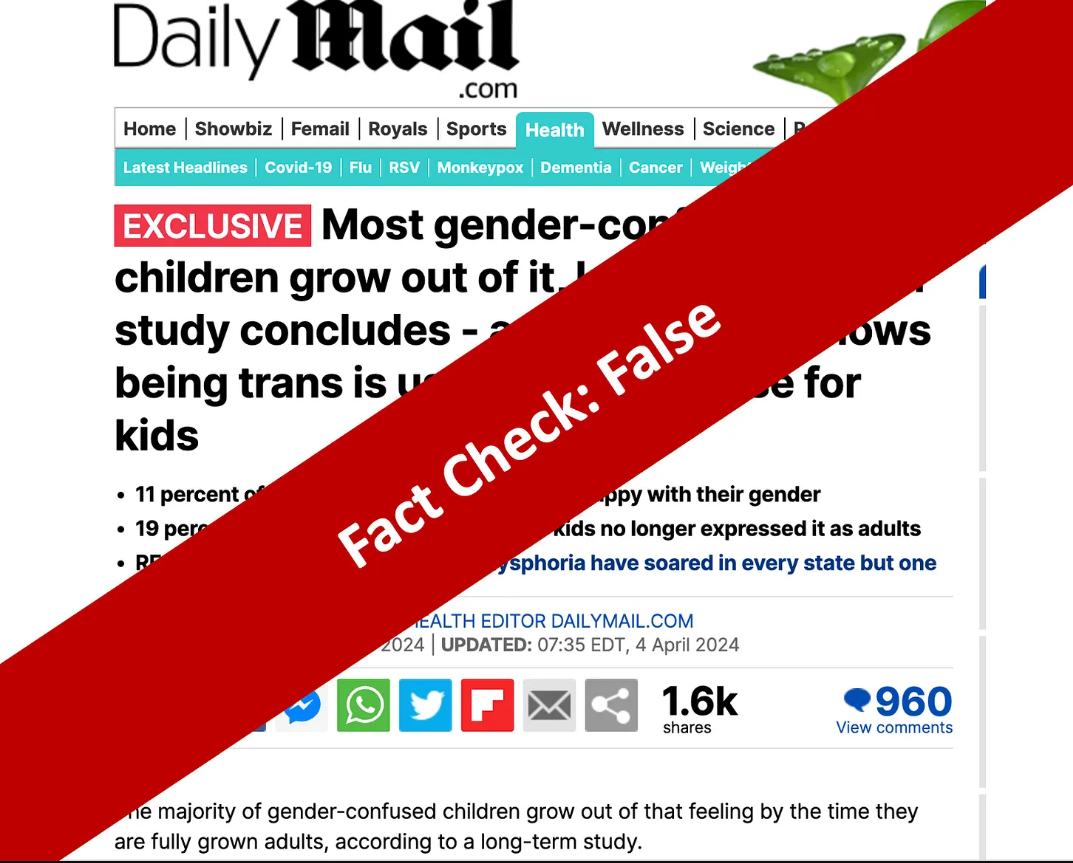
By Erin Reed | WASHINGTON – On Thursday, the Daily Mail reported that a new “landmark study” from the Netherlands concluded that being transgender was “just a phase” and that most children “grow out of it.”
News of the study was widely reported on Twitter by conservative accounts, with tweets about the Daily Mail’s reporting of the study garnering tens of millions of views. Unfortunately, the headline fails a fact check: the study was not about transgender individuals, but rather on people who sometimes express dissatisfaction with their sex for a variety of reasons entirely unrelated to being transgender.
The Claims:
The study to which the Daily Mail refers was published in the Archives of Sexual Behavior. This journal, under the leadership of Kenneth Zucker, a noted anti-trans figure known for his involvement in reparative/conversion therapy, has become a parking journal for anti-transgender research. The study aims to examine a single question from 15 years of surveys administered to 2,772 children in the Netherlands who transitioned into adulthood: “I wish I were the opposite sex.” Respondents were asked to indicate their feelings by circling 0 for “never,” 1 for “sometimes,” and 2 for “often.” A copy of the question can be viewed here:
The study ultimately reveals that approximately 12% of 11-year-old children, with some variance between those assigned male at birth and those assigned female at birth, indicate a desire to be the opposite sex either “sometimes” or “often,” with the vast majority selecting “sometimes.” By adulthood, this percentage decreases to 2-3%. In addition, 19% of the sample circle sometimes or often at some point in their lives. From these findings, the Daily Mail infers that “The majority of gender-confused children grow out of that feeling by the time they are fully grown adults,” although the term “gender confused” is not used in the original study. The headline, which claims “Critics Say It Shows Being Trans Is Just a Phase,” suggests that the study supports this notion.
The Daily Mail also provides charts that claim to illustrate this finding, though these charts contain egregious inaccuracies. For example, the Daily Mail’s chart mistakenly swaps the labels for “M” and “F” compared to the original study. More significantly, the Daily Mail’s chart reverses the categories for “sometimes” and “often,” creating the impression that the majority of youth who respond positively to the question do so “often,” when, in fact, the original study’s chart indicates that most children who answer affirmatively only “sometimes” wish they were the opposite sex. It’s also important to note that “sometimes” encompasses even those who “rarely” experience this wish.
See the Daily Mail’s chart vs the actual study’s chart:
The Problems:
There are immediate issues with both the study and the Daily Mail’s interpretation of it. The most evident issue with the study is that it is not a study of transgender individuals; this should be apparent considering that a full 19% of participants indicated “sometimes” or “often” in response to wanting to be the opposite sex at some point in their lives, with the majority selecting “sometimes.” Even the most generous estimates suggest that approximately 0.5% of Americans identify as transgender. It is clear that the authors are measuring an entirely different population by analyzing responses to this single question.
It is easy to see how various individuals might respond “sometimes” (which includes rarely) or “often” to this question. Tomboys, feminine gay teen boys, gender nonconforming individuals, people who experience sexism, and even those with curious minds might answer affirmatively without ever identifying as transgender. If someone has ever momentarily wished to be the opposite sex, for any reason, even in passing, they would be categorized as “gender noncontent.” Should that individual later state when older that they no longer ever experience this desire, they would then be classified as experiencing “decreasing” gender noncontentedness.
Of course, transgender identification is not accurately gauged by answering a single question. Instead, gender dysphoria diagnoses require a persistent, consistent, and insistent desire to be the other sex lasting 6 months, as well as 5 of 7 other criteria, such as a dislike of one’s own sexual anatomy, a desire for sex characteristics to match their experienced gender, preference for cross sex roles in make-believe play, and more. The study, on the other hand, looks at an isolated question at individual moments in young people’s lives and clearly cannot be used as a proxy for transgender people.
Although the study encompassed a wide range of participants beyond just those who are transgender, it provides intriguing insights into a subset of the sample that might actually identify as transgender. Epidemiologist Gideon Meyerowitz-Katz, in his analysis published early Friday morning, delved into the data. Meyerowitz-Katz found, “Overall, the proportion of children aged 10-12 who said they ‘often’ wanted to be the opposite sex decreased from 2% to 1% by the age of 12-14, and then remained constant. Therefore, we could reasonably argue that, based on this study, transgender identification tends to stabilize by the age of 12.” Meyerowitz-Katz adds that even though this is evidence of a stable gender identity for transgender people, even answering “often” on the survey is not a good proxy for transgender identification; the response is provided only as a snapshot, and reasons for answering “often” on that single question are numerous.
“Ultimately, despite the media furor, these results tell us very little about transgender children. At best, it seems likely that children who have a strong trans identity at ages 10-14 probably don’t change that much, while those who only sometimes think about being another gender may change their minds a bit more – how this relates to the proportion of kids who no longer identify as another gender when they grow up is anyone’s guess.”
For these reasons, it is clear that a fact check renders the claims made about the study completely unsupported.
However, there is more to said on the study: it represents a perfect illustration of the problem in many old studies that claim to demonstrate transgender “desistance,” or the notion that transgender individuals cease to identify as trans as they age. The Daily Mail interviews Jay Richards, introduced as the director of the Richard and Helen DeVos Center for Life, Religion, and Family at the Heritage Foundation (though it leaves the Heritage Foundation portion out of the introduction). Richards asserts, “Indeed, we can infer from the DSM 5 [2013] and other sources that as many as 88 percent of gender-dysphoric girls and as many as 98 percent of gender-dysphoric boys in previous generations desisted if allowed to go through natural puberty.”
This “80% desistance myth” has been fact checked as false in a separate article, yet this study presents the most direct evidence of the origin of the “80%” statistic that Richards pushes in the Daily Mail article. Ironically, this article and the associated study makes it easier to critique of the reliability of many older studies on the persistence of gender identity among youth from the 1990s to 2000s. In the 1990s and 2000s, gender dysphoria was not a diagnosis; instead, the diagnosis was gender identity disorder. The only singular required criterion was a “discomfort with the gender role of the assigned sex” – there was no requirement for a child to desire or insist that they were another sex. The diagnosis was also pathological and often resulted in parents of “sissy boys” or masculine girls taking their children in for psychological treatment.
You can see the old requirements vs the new requirements here:
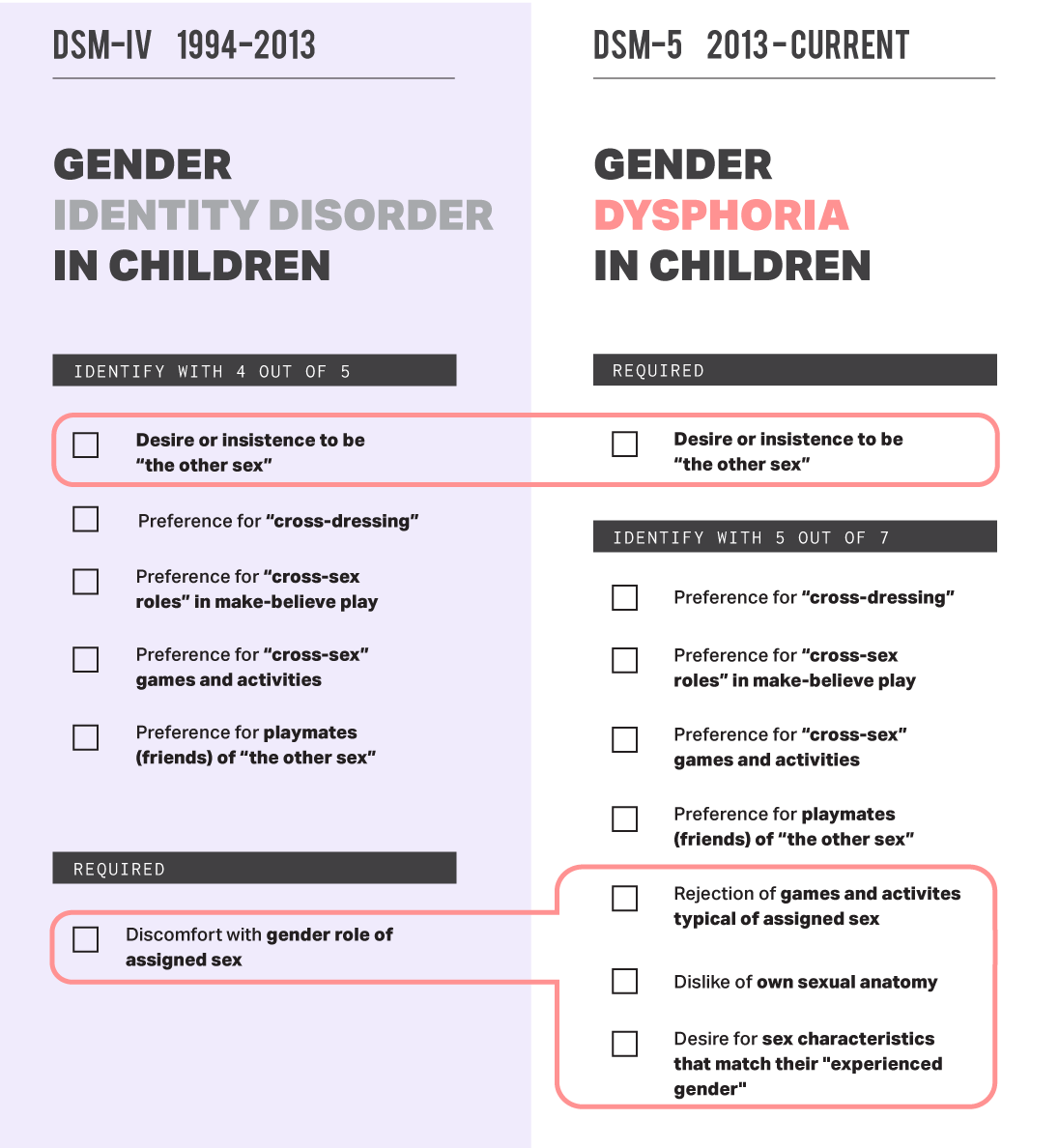
The belief that individuals desist from transgender identities at high rates traces back to Kenneth Zucker, the editor of the journal in which this current study was published. In the 1990s, Zucker led a clinic and conducted research on “desistance” from being transgender, giving rise to the “80% of transgender youth desist” narrative.
A later review revealed that approximately half of the patients at his clinic did not meet the criteria for gender identity disorder then in place. Moreover, even those who did meet these criteria were often subjected to practices now widely considered unethical, akin to conversion or reparative therapy. Such practices included withholding toys and clothing associated with the gender the child identified with, forcing children to play in ways that aligned with their sex assigned at birth, among others. Treatment approaches were reportedly influenced by parental wishes regarding their child’s gender identity.
Both Zucker and another researcher, Thomas Steensma, have published studies on the “desistance” of individuals purported to represent transgender youth in earlier decades. It’s important to note, however, that the criteria for diagnosing gender dysphoria have undergone significant changes since the 1990s and early 2000s. Studies claiming to demonstrate “high desistance” rates uniformly suffer from a critical flaw that was prevalent during those decades: gender nonconformity was pathologized, leading these studies to encompass a much broader group of individuals than just those who are transgender. This recent study replicates the same error in a perhaps easier to see fashion, making it a perfect example of the problems inherent in utilizing older datasets for current research on gender identity.
Despite the study clearly not showing what the headline from The Daily Mail claims it shows, major conservative influencers spread misinformation on the study, leading to widespread distribution of factually incorrect information about transgender people. Ian Miles Cheong shared the study, stating, “being transgender is a trend — it’s a phase some kids go through and eventually grow out.” That post was then shared by Elon Musk, who said, “kids need to be protected at all costs.” Those posts sharing the article were viewed over 35,000,000 times on Twitter alone.
Journalists should be cautious interpreting old studies regarding transgender people, and should check in with researchers on transgender care before publishing incorrect and inflammatory headlines on transgender care.
Further reading on the Daily Mail article and the study itself can be found here:
- Gideon M-K/Health Nerd: “Do “Most Gender Confused Children Grow Out Of It”?”
- Fractionalgirl Twitter Analysis Of The Study
- Joss Prior’s Thread On The Study
*************************************************************************

Erin Reed is a transgender woman (she/her pronouns) and researcher who tracks anti-LGBTQ+ legislation around the world and helps people become better advocates for their queer family, friends, colleagues, and community. Reed also is a social media consultant and public speaker.
******************************************************************************************
The preceding article was first published at Erin In The Morning and is republished with permission.
Political commentary & analysis
Southern states push bills ending legal recognition for trans people
Louisiana, Mississippi, & Alabama all advancing bills that “define sex” to exclude trans people from any legal recognition of their gender

By Erin Reed | WASHINGTON – The pace of anti-transgender legislation has slowed in recent weeks, with several states, known for previously targeting transgender individuals, failing to pass any such laws.
However, a different dynamic is emerging across the Gulf South, where three states are advancing bills that would cease the legal recognition of transgender individuals, potentially having significant repercussions for their trans residents. Louisiana, Mississippi, and Alabama are introducing bills to define sex in a manner that excludes transgender individuals, potentially affecting birth certificates, driver’s licenses, bathroom access, and more.
The bills, dubbed the “Women’s Bills of Rights” by their supporters, fall far short of actually protecting women’s rights. They fail to protect access to birth control or abortion, do not ensure equitable pay, neither allocate funds for nor promote women’s athletics, and lack any provisions designed to curb violence against women. Instead, they categorize sex based on reproductive capabilities and ends legal recognition of transgender individuals’ gender identities.
In Louisiana, House Bill 608 was introduced with a staggering 63 Republican co-sponsors, signaling a strong opposition to any efforts to lobby against the bill. While its primary focus seems to be on restricting bathroom access in schools, prisons, and shelters, a particular section of the bill indicates that “any provision of law enacted by the legislature or any rule adopted by a state agency or other entity subject to the Administrative Procedures Act when applicable to an individual’s sex shall apply those definitions provided in R.S. 9:58.” This provision could lead to the banning of changes to birth certificates and driver’s licenses, effectively ending all legal recognition for transgender individuals. The bill has not yet been scheduled for a hearing, but given the substantial support it has garnered, its progression through the legislative process is anticipated to be swift once it begins.
In Mississippi, Senate Bill 2753 and House Bill 1607 have successfully passed their respective chambers. House Bill 1607 defines sex based on reproductive capacity, and puzzlingly states that for transgender individuals, “equal” does not mean “same” or “identical.” Notably, the bill does not provide a definition for “equal,” a term also left undefined in similar legislation in other states. This ambiguity sparked debate over a comparable bill in Iowa, which is currently stalled in the legislature there in part because of disagreements over that line. As for Senate Bill 2753, it would ban bathroom access for transgender individuals in publicly owned facilities, such as rest stops and the Jacksonville airport.
In Alabama, House Bills 111 and 130 similarly target transgender individuals. House Bill 111 specifies sex based on reproductive capacity for all vital statistics purposes. Meanwhile, HB 130, although not directly defining sex, will reportedly be amended to add language that extends “Don’t Say Gay” legislation to Space Camp. This addition comes after conservative media expressed outrage over a transgender individual being employed at the state’s renowned Space Camp and could be used to target transgender employees in state facilities.
So far, only five states have passed similar legislation: Kansas, Montana, North Dakota, Tennessee, and Utah. In Kansas, a judge has recently ruled in favor of Attorney General Kris Kobach that drivers licenses and birth certificates must contain transgender people’s old assigned sex at birth, citing the law there. Meanwhile, although such a law does not exist in Florida, rule changes have resulted in a lack of ability for transgender people to change their drivers licenses; reportedly, Florida residents are unable to change their birth certificates as well. Additionally, Oklahoma and Nebraska have executive orders defining sex similarly.
You can see a map of states from the Movement Advancement Project with such legislation here:
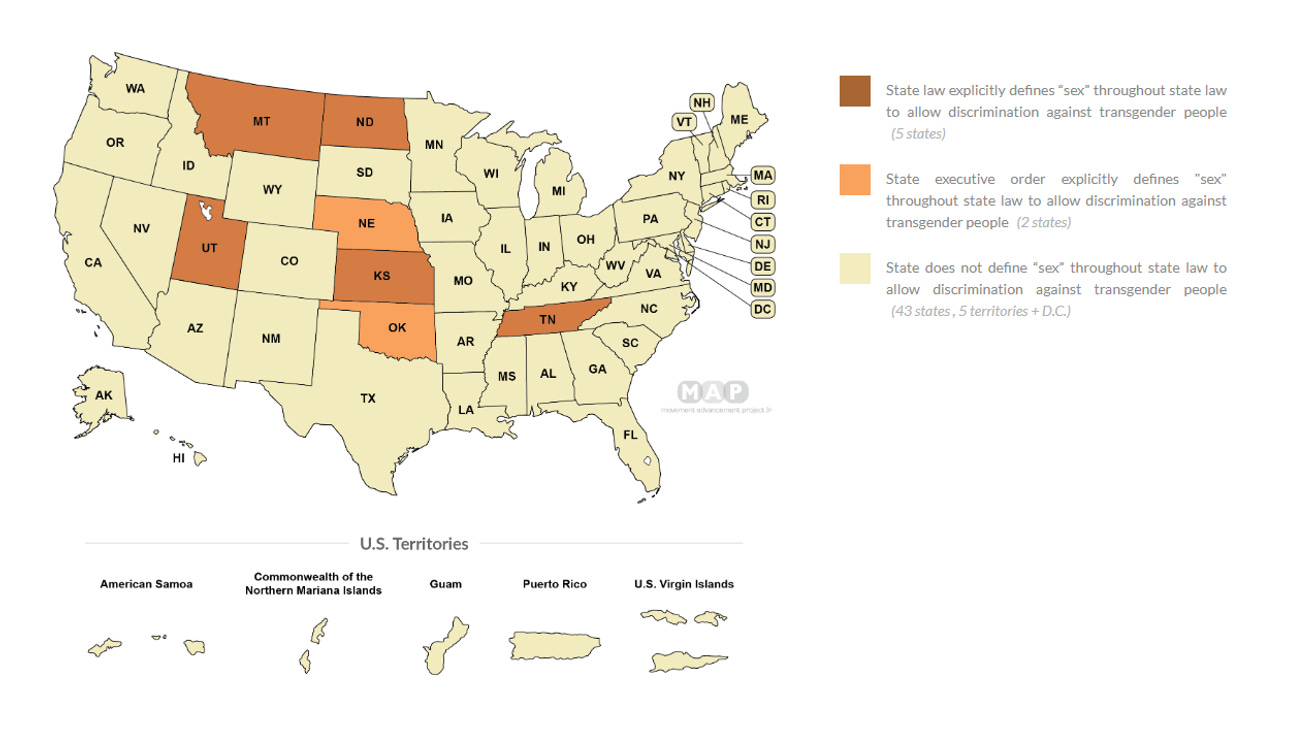
Should these bills become law, an increasing number of states will not legally recognize transgender individuals. The implications of such legislation are profound: individuals who have long since updated their identity documents may face the reversion of those documents back to their assigned sex at birth. These state-issued identification documents could then be employed to enforce additional anti-transgender laws, including bathroom bans. Moreover, these restrictions are bound to create complications for transgender individuals who have legally updated their federal documents to align with their gender identity, as these documents would conflict with their state-issued ones.
There have been calls for a federal legal response to bills that outlaw gender markers and refuse legal recognition to transgender people. For instance, in Florida, the entire Democratic congressional delegation asked the Biden Administration to use the Real ID act, which mandates “gender” be listed on drivers licenses. There has been no response to that request as of Monday.
Multiple lawsuits are underway trying to reverse the laws in court where they have passed, but the legal outcomes are currently pending.
****************************************************************************

Erin Reed is a transgender woman (she/her pronouns) and researcher who tracks anti-LGBTQ+ legislation around the world and helps people become better advocates for their queer family, friends, colleagues, and community. Reed also is a social media consultant and public speaker.
******************************************************************************************
The preceding article was first published at Erin In The Morning and is republished with permission.
Political commentary & analysis
Republicans issue new shutdown threat over trans people
On Wednesday, the House Freedom Caucus issued a letter indicating that the government may shut down if anti-trans polices are not included
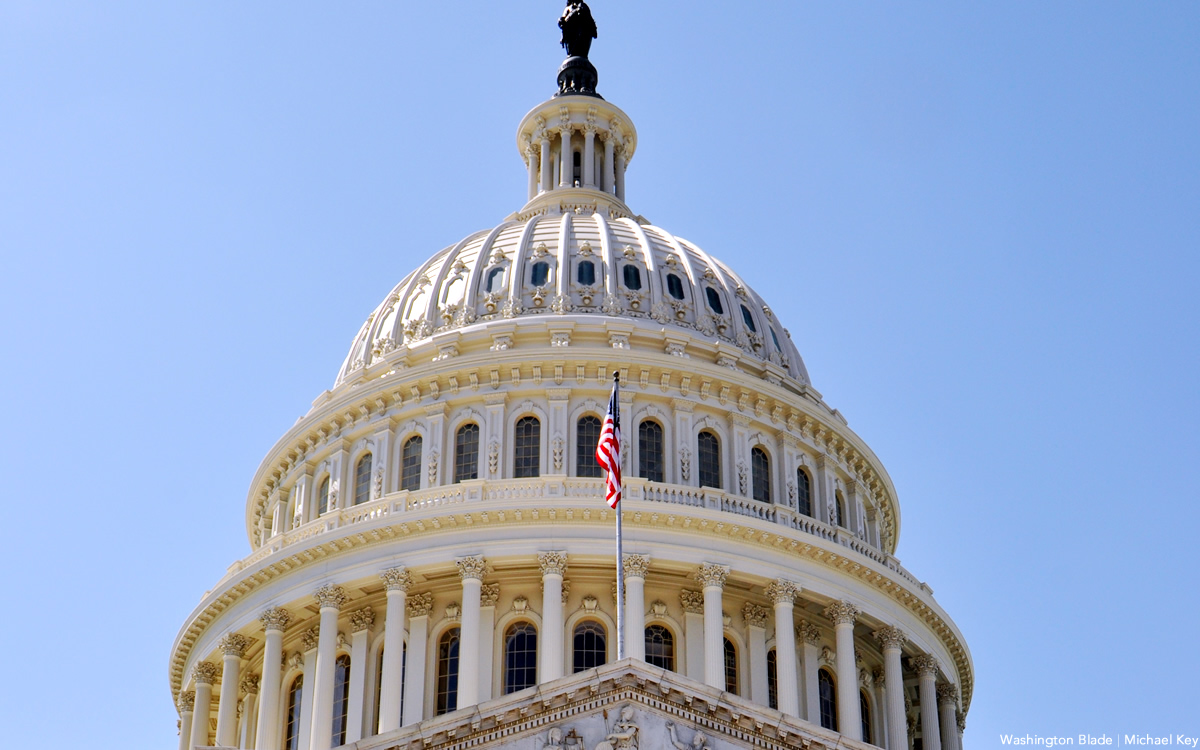
By Erin Reed | WASHINGTON – On Wednesday, the House Freedom Caucus published a letter threatening a government shutdown in which it outlines a number of policies that are needed to supposedly avert such a result.
Listed among these policies are restrictions on gender affirming care, transgender participation in sports, DEI programs, and defunding Planned Parenthood. This comes after nearly a dozen riders targeting transgender people have been inserted into numerous government spending bills that could result in large scale government shutdowns if not handled by March 8th.
In an exclusive released by Axios, Republican sources state that “people are predicting a shutdown.” The report states that one of the primary drivers of the shutdown frustrations are policy riders on gender-affirming care and abortion.
Currently, Speaker Mike Johnson’s negotiations reportedly do not include gender affirming care policies, which is upsetting Republicans who have pushed for the inclusion of those policies in the final bill. Biden has stated opposition to any bill that contains them, and the riders did not make the final cut for the previous stopgap budget bill.
Now, in a letter from the House Freedom Caucus, Republicans state that unless these policies are included, the “probability that the appropriations bills will be supported by even a majority of Republicans” is low.
See the full letter here:
Increasingly, Democrats and LGBTQ+ organizations have applied pressure on the Biden administration and Democratic leadership not to accept any deal that includes anti-LGBTQ+ riders. In a letter signed by 163 Democratic members of congress, they state that bans on gender affirming care, pride flags, DEI initiatives, and discrimination should not be on the table for negotiation. Human Rights Campaign has likewise released an advertisement echoing that message:
These policies encompass bans on pride flags, prohibitions on insurance coverage, restrictions on DEI programs, and even the defunding of children’s hospitals that offer gender-affirming care.
Such measures could lead to nationwide bans on care if “federal funding” is broadly interpreted. These provisions are found in funding bills for the Food and Drug Administration, the Department of Health and Human Services, the military, and the Department of Veterans Affairs, among other sectors.
Some factions within the Republican Party have increasingly indicated that targeting transgender individuals is a top priority and may view a shutdown as worth the political risk over transgender issues. Representative Dan Crenshaw stated in June that such bans are the “hill we will die on.”
It would not be the first time government operations have ground to a halt over transgender issues; in 2023, Republicans refused to move forward with any other bills unless they could pass a ban on gender-affirming care, allowing a filibuster to last for three months. Should this occur at the national level, however, it would represent the most significant impact of anti-trans policies on multiple sectors of government.
Democrats have not shown a willingness to compromise over national anti-transgender riders so far. However, if a new bill is not passed by March 1st, a partial government shutdown will trigger; March 8th is the deadline for a full government shutdown.
Should Republican leadership proceed without any of the anti-trans policy riders, many Republican voters will likely vote against the bill, and Speaker Johnson could see his own speakership threatened. Until the 2024 general elections, the riders represent the largest risk for transgender people and their care nationwide.
***************************************************************************

Erin Reed is a transgender woman and researcher who tracks anti-LGBTQ+ legislation around the world and helps people become better advocates for their queer family, friends, colleagues, and community. Reed also is a social media consultant and public speaker.
The preceding post was previously published at Erin in the Morning and is republished with permission.
-

 Tennessee3 days ago
Tennessee3 days agoTennessee: Anti-LGBTQ parents can now foster, adopt LGBTQ kids
-

 Ventura County4 days ago
Ventura County4 days ago“Queers in the Valley” Ojai launches & is ready to celebrate Pride
-

 California Politics4 days ago
California Politics4 days agoRecognizing & celebrating lesbians: Mayor Pro-Tem of El Cerrito
-

 Research/Study4 days ago
Research/Study4 days ago90 percent of trans youth live in states restricting their rights
-

 Maine4 days ago
Maine4 days agoMaine’s Governor Mills signs trans & abortion sanctuary bill into law
-

 Politics3 days ago
Politics3 days agoKenyatta may become first LGBTQ statewide elected official in Pa.
-

 West Hollywood2 days ago
West Hollywood2 days agoUpdated: WeHo’s The Abbey Nightclub was sold for $45 Million
-

 Mexico1 day ago
Mexico1 day agoMexican Senate passes bill to ban conversion therapy
-

 Alabama3 days ago
Alabama3 days agoAlabama House approves expansion of state’s ‘Don’t Say Gay’ law
-

 Caribbean4 days ago
Caribbean4 days agoDominica High Court of Justice decriminalizes homosexuality

